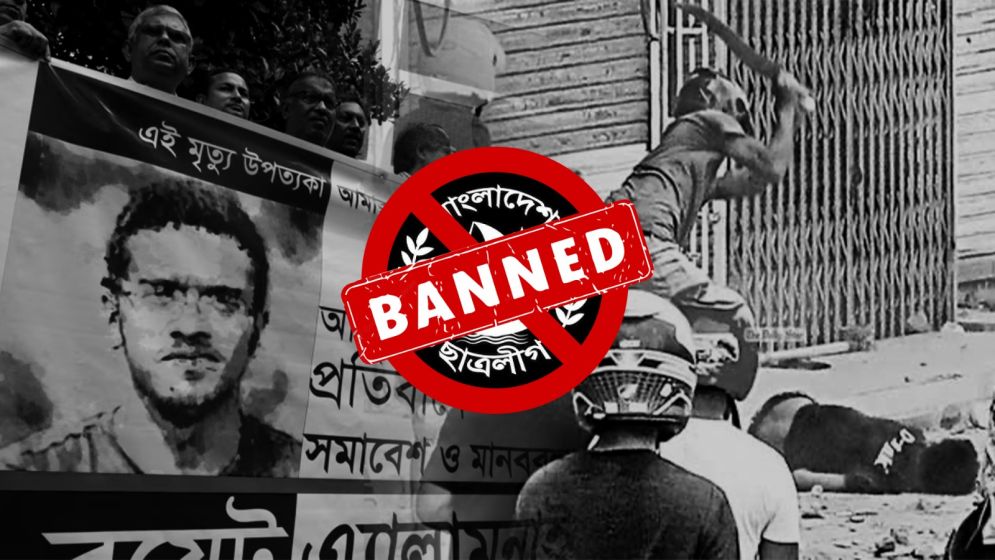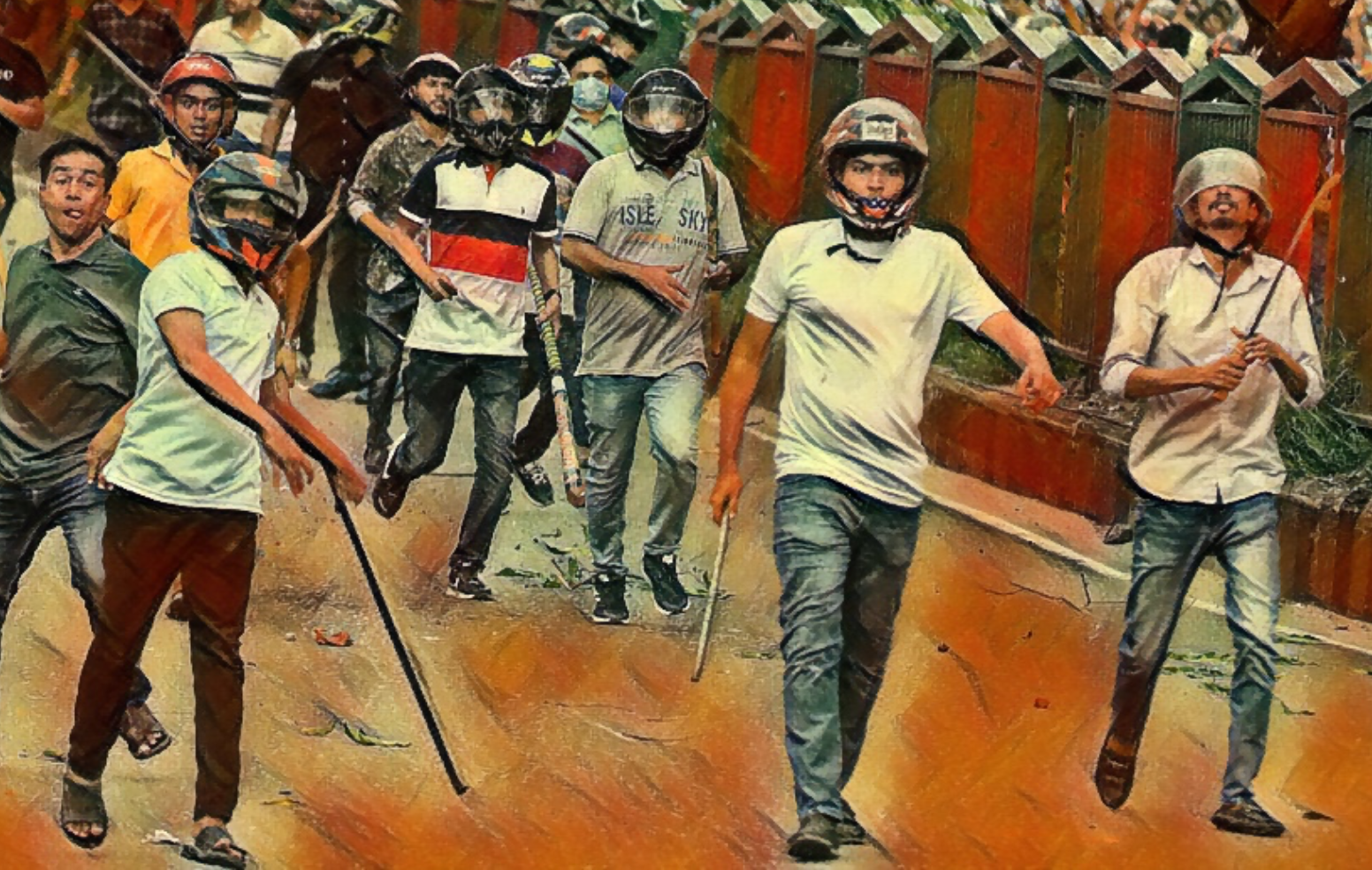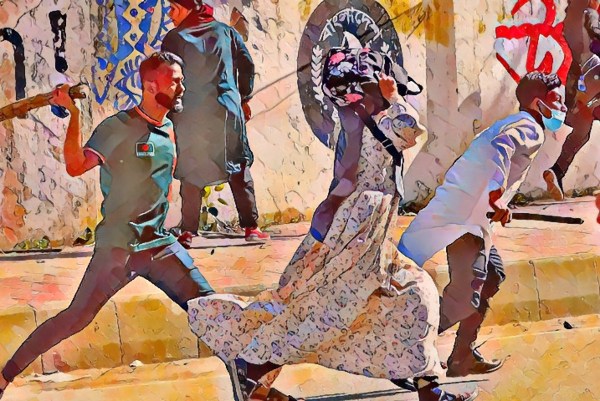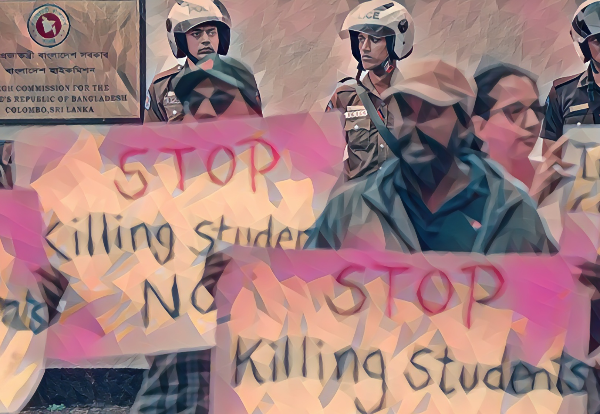A Decade of Darkness: How the Chhatra League’s campus suppression justifies its label as a "terrorist" organization
Shahadat Swadhin
Publish: 24 Oct 2024, 03:28 PM

For over 15 years, ending on August 5, 2024, the Bangladesh Chhatra League (BCL) wielded power far beyond its intended purpose as a student political organization.
Functioning as a de facto paramilitary force for the ruling Awami League, the BCL's influence pervaded Bangladesh's universities and colleges.
This period was marked by a disturbing pattern of violence, intimidation, and impunity, effectively suppressing political opposition and silencing dissent within academic institutions.
The BCL's dominance was particularly evident in its systematic suppression of opposition student groups. Between 2014 and 2024, these groups faced relentless obstruction, their attempts to organize and express dissenting views met with intimidation and violence.
This created a chilling effect on campus political discourse, stifling open debate and critical thinking.
The controversial elections of 2014 and 2018, marred by allegations of electoral fraud, further emboldened the BCL, solidifying its control over student politics and enabling it to act with even greater impunity.
The consequences of the BCL's unchecked power were far-reaching. Campuses became sites of frequent clashes, with violence often escalating into bloodshed. Ordinary students found themselves caught in the crossfire, their education and well-being compromised.
The BCL's actions not only undermined the democratic principles of freedom of speech and assembly but also fostered a climate of fear and repression within the academic community.
Ultimately, the BCL's role as an enforcer for the ruling party came at a steep cost, contributing to rising violence, deepening political polarization, and a pervasive sense of insecurity on campuses across Bangladesh.

Data paints a
disturbing picture
A study I conducted, analyzing data from 44 print and online media outlets, paints a disturbing picture of the BCL activities between 2009 and 2023.
This research, which tracked and categorized 14 types of incidents, including murder, rape, extortion, and political persecution, reveals a stark escalation of violence over this period.
The BCL's brutality is tragically exemplified by high-profile murders like that of Abrar Fahad in 2019.
Fahad, a student at the Bangladesh University of Engineering and Technology (BUET), was brutally killed by BCL members for criticizing the government on social media, an act that sent shockwaves across the nation.
This incident, along with the 2012 murder of Biswajit Das, an innocent tailor killed by BCL activists, underscores the organization's willingness to resort to extreme violence to maintain political dominance.
Beyond physical violence, the BCL's reign of terror included rampant sexual violence.
Between 2009 and 2023, the study documented 14 reported cases of
rape and 69 instances of sexual assault perpetrated by BCL members.
A particularly egregious incident in 2015 saw BCL leaders publicly strip and assault women at Dhaka University, highlighting their blatant disregard for the law and the safety of others.
The everyday reality for many students was one of persistent harassment and fear. The study revealed that 1,032 students were victims of violence in 339 separate incidents involving BCL members between 2009 and 2023.
These incidents, which included physical assaults, mental torture, and coercion, often occurred openly, yet were largely ignored by university authorities. This created a culture of impunity, where BCL members felt empowered to act without consequence, leaving students vulnerable to their abuse.

BCL’s unchecked
corruptions
Corruption was endemic within the Bangladesh Chhatra League (BCL), further tarnishing its image and undermining the integrity of Bangladesh's educational institutions.
The organization was implicated in a wide range of illicit activities, including the illegal sale of dormitory seats, manipulation of tenders, and extortion from both students and university officials.
Their involvement in recruitment scams and the issuance of fake certificates eroded academic standards, effectively transforming campuses into hubs of corruption.
A prime example of this deeply ingrained corruption was the 2019 Jahangirnagar University "Mega Project Scam," which forced the resignation of high-ranking BCL leaders after they were caught demanding commissions from the Vice-Chancellor.
This scandal exposed the extent to which corruption had permeated student politics, highlighting the urgent need for reform.
From 2009 to 2023, the BCL's involvement in criminal activities extended far beyond campus confines. Reports indicate that BCL members were implicated in 53 cases of extortion, 39 incidents of tender manipulation, and 30 robberies, many of which occurred within educational institutions.
This pervasive criminality not only compromised the safety and security of students but also eroded public trust in the country's education system.
Adding to this turmoil, the BCL was plagued by internal conflicts. Between 2009 and May 2023, the organization was involved in 513 intra-party clashes, resulting in the deaths of 47 activists and injuries to 3,884 others.
These violent power struggles often spilled over into the wider campus environment, disrupting academic activities and creating a climate of fear.
Furthermore, violent confrontations with opposition student groups, such as Chhatra Dal and Chhatra Shibir, led to thousands of injuries, arrests, and expulsions, particularly at volatile hotspots like Dhaka University and Chittagong University.
This cycle of violence further destabilized campuses and hindered the pursuit of education for countless students.

BCL is banned but will
there be a reckoning?
Beyond the violence and corruption, allegations of academic fraud, forgery, and even drug dealing further taint the legacy of the BCL, eroding any remaining vestiges of its credibility.
The unchecked power wielded by the BCL has transformed universities — once envisioned as sanctuaries of free thought and intellectual growth — into environments stifled by fear and oppression.
As we examine 15 years of BCL dominance, it becomes tragically clear that an organization originally intended to champion student interests has instead become synonymous with campus violence, political coercion, and corruption.
To secure a brighter future for Bangladesh's youth, it is imperative to cultivate academic spaces free from fear, where fundamental rights are upheld and justice prevails.
While the BCL's ultimate fate may lie in the hands of the courts, accountability for the crimes committed over the past 15 years remains paramount. These crimes, meticulously documented, demand justice.
The ruling Awami League's failure to hold the BCL accountable has allowed a culture of impunity to flourish, where those who dared to seek justice were met with threats, harassment, and violence.
The recent crackdown on students by the BCL, commencing on July 15, 2024, at Dhaka University, Jahangirnagar University, and Chittagong University, represents yet another dark chapter in this protracted saga of violence.
While cases have been filed against implicated BCL members by a DU student and JU authorities, it is crucial to recognize that the BCL's criminal activities did not originate on July 15th; they have been deeply entrenched since 2009.
Although the BCL is now designated a banned organization due to its terrorist activities, the demand for justice regarding the crimes committed over the last 15 years remains urgent and cannot be ignored.
A comprehensive reckoning is necessary to break this cycle of violence and ensure that Bangladesh's universities can truly fulfill their promise as centers of learning and intellectual freedom.
—
Shahadat Swadhin is a Research Scholar, Department of International Relations, South Asian University, New Delhi
